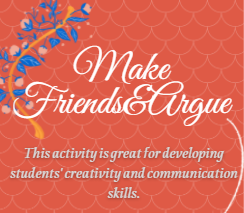Social Networking as an Educational Tool
In today’s world, internet is an inseparable part of
our lives. We use technological tools everyday for everything. Therefore, using
those tools for educational purposes is one of the best things we can do with
them. With the available sources such as video conferances, online courses,
practices that can be made online, e-books, free educational websites and apps,
using technology for education is easier in every respect. Additionally, using
them creatively and of course, suitably, make learning something that everyone
can actually enjoy. Students’ creating an educational blog, for example, is a
way to make them use technological tools effectively.
When they create something on their own, they could
see what they have learnt in the learning process, and have visible outcomes.
Writing about a topic, practicing creative thinking and doing researches to
gather the information needed can be a different and entertaining useful
development in classes. According to Boyd, social networking sites have three
defining characteristics: Profile, traversable, publicly articulated social
network and semi-persistent public comments. These three mentioned
characteristics do not refer to educational tools directly, but they can be
used for this purpose if used wisely.
In social networking, the focus is on participation,
rather than publishing. With this in hand, people learn together better with
user-generated content. With user-generated content, learners can engage in the
construction of this aimed educational experiences. Group activities made in
online platforms excite young learners. Learners feel satisfied when their
interests are involved in the work they are doing, and since they work together
or study with others, each participation adds value to the task. Blogging and
social networks are superior tools for students, because using these tools help
students to clarify concepts, make meaningful relationships and examine their
mental models. As it is stated in the passage, “By providing a compherensive
record of how concepts take form through multiple clusters of knowledge, such
media can promote more complex and lasting retention of course ideas among
students.” (Boettcher,2007)
Social networking use in purpose of education helps
students in such ways, and one advantage of this is that students feel less
stressed compared to the usual classroom procedure. They do not have to learn
something in a certain time as they have access to the given information any
time when they have it online. Additionally, teachers should use the most
suitable program for their students. Also, with using social networking,
students develop critical thinking skills, analysis of the content of websites
and they also have a chance to comment each-other’s assignments, as a result,
have a different idea about a topic. On the other hand, Cross calls the
environment of informal learning a learnscape, which sounds like a landscape.
The similarity between them is that in a landscape, the purpose is
conceptualizing a pleasing environment. And for a learnscaper, for a teacher,
the most important thing should be increasing the organization’s longevity and
health, with providing them a safe, stress-free, supportive environment. In
this process, teachers should be aware of the fact that it is not their job to
control their students, students should not be feel forced to do something.
Instead of that, teachers should help their students in reaching their fullest
and their highest potential.
According to the studies of student behaviour, Millennials
have some common characteristics such as multitasking, preference for the use
of visual materials in learning rather than using texts, and preference for
interactive activities, studying in groups rather than studying individually.
As a result of these characteristics, there are common disadvantages, too. These
include lack of attention and reflection, poor text literacy, All of these
skills, whether positive or negative, in some ways can be attributed to social
networking.



Yorumlar
Yorum Gönder